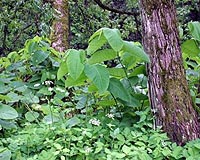 |
Rio De Janeiro (UPI) Mar 9, 2009 Overfishing is threatening to decimate Brazil's seafood resource and the latest danger concerns the country's sardine catch, which has led officials to speed up plans for conservation of the species. Sardine is part of the staple diet in Brazil's coastal areas and most of last year's catch of 100,000 tons was unloaded in the states of Rio do Janeiro, Santa Catarina and Sao Paulo, MercoPress reported. However, overfishing blights some 80 percent of marine species in Brazilian waters and despite warnings and exhortations to the fishing industry, yields in excess of recommended quantities are a common occurrence. The problem of fishing has reached crisis proportions in Argentina, where hake yields in excess of recommended levels now a pose a threat to preservation of the biomass in the seas -- a problem now familiar to Brazilians as well. Overfishing put Brazil's sardine stocks at risk in the 1990s but a conservation program restored the biomass somewhat, only to be depleted again. Fishing authorities have been struggling to enforce two bans on fishing each year, from the middle of June to the end of July and again from November to February. The first ban is geared to help regeneration of the biomass to safe levels and the second is to facilitate sardines to develop to an ideal catch size, experts said. Officials said Brazil might need to start importing sardines if its domestic consumption kept rising at the current pace. Meanwhile, Argentina is trying to restrain fishing in Patagonia's San Jorge Gulf to preserve stocks of the common hake. But the conservation aim is challenged by fishing targets set by the Argentine Federal Fisheries Council, which plans to increase the yield by 27 percent this year. Argentina's government has been exploring ways of regenerating the country's fishing industry. One of the investment initiatives calls for a Russian company, Sturgeon and Caviar, to set up a sturgeon farm in the La Rioja province. The technique of breeding sturgeon, until recently specific to the Caspian Sea, was pioneered about five years ago in Uruguay. As caviar production in the Caspian dwindles and is threatened with extinction, the projects in Argentina and Uruguay are aimed at saving the fish, if not the heavily Caspian Sea. Latin American partners of Russia hope the methods applied for sturgeon farming may help lead the way to a better management of Latin America's own endangered fish stocks, including those affected by overfishing.
Share This Article With Planet Earth
Related Links Farming Today - Suppliers and Technology
 Japanese bug released in Britain to tackle weed problem
Japanese bug released in Britain to tackle weed problemLondon (AFP) March 9, 2010 A Japanese insect is to be introduced on a trial basis in Britain to tackle a damaging super-weed, the government announced Tuesday. The Japanese knotweed was originally used as an ornamental plant in gardens across Britain but has rapidly spread, costing over 150 million pounds (225 million dollars, 165 million euros) a year to control. Agricultural and environmental research organisati ... read more |
|
| The content herein, unless otherwise known to be public domain, are Copyright 1995-2010 - SpaceDaily. AFP and UPI Wire Stories are copyright Agence France-Presse and United Press International. ESA Portal Reports are copyright European Space Agency. All NASA sourced material is public domain. Additional copyrights may apply in whole or part to other bona fide parties. Advertising does not imply endorsement,agreement or approval of any opinions, statements or information provided by SpaceDaily on any Web page published or hosted by SpaceDaily. Privacy Statement |